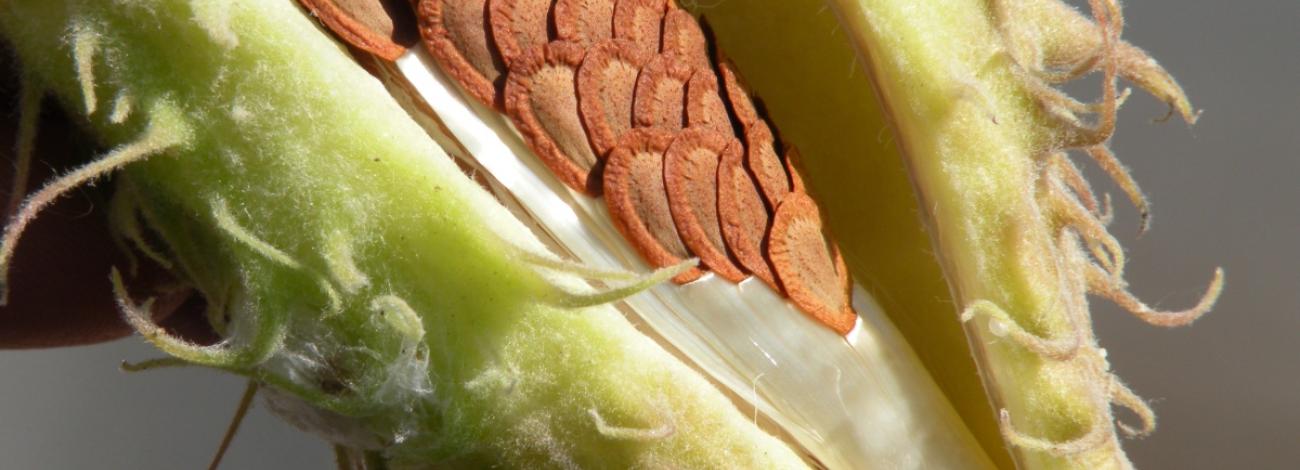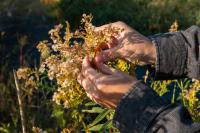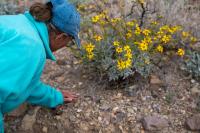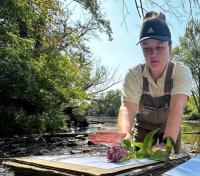
Seeds of Success Native Seed Collection Program
Seeds of Success (SOS) is the national native seed collection program, led by the Bureau of Land Management (BLM) in partnership with a variety of federal agencies and non-federal organizations. SOS’s mission is to collect wildland native seed for research, development, germplasm conservation, and ecosystem restoration. The long-term conservation outcome of the SOS program is to support the native plant materials development process, by which the BLM increases the quality and quantity of native plant materials available for restoring and supporting resilient ecosystems.
SOS teams share a common protocol and coordinate seed collecting and species targeting efforts. Ultimately, SOS aims to make at least 10-20 collections per species, per seed transfer zone. This ensures that the full range of genetic diversity is available for restoration and research such as common garden studies.
To date, SOS has more than 27,000 native seed collections in its National Collection. This material is being used for research such as germination trials, common garden studies, and growing protocol establishment. Additionally, these seeds, and those grown from them, are used for restoration projects such as endangered species habitat restoration, mining reclamation, and emergency stabilization and rehabilitation. Portions of each collection are also held in long-term storage facilities for conservation.
Seeds of Success was established in 2001 to collect, conserve, and develop native plant materials for stabilizing, rehabilitating, and restoring lands in the United States. The project quickly grew to include many additional federal and non-federal partners, such as botanic gardens, arboreta, zoos, and municipalities. In June of 2008, a Memorandum of Understanding was signed by the Bureau of Land Management, Chicago Botanic Garden, Lady Bird Johnson Wildflower Center, New England Wild Flower Society, New York City Department of Parks and Recreation, North Carolina Botanical Garden, and the Zoological Society of San Diego. The 2008 MOU ratified Seeds of Success as a national native seed collection program in the United States coordinated by BLM. In 2023, BLM signed an interagency Memorandum of Understanding with the U.S. Fish and Wildlife Service and the National Park Service. This MOU provides an opportunity for the three agencies to leverage expanded SOS funding and coordination to collect, conserve, and restore native plant communities across Department of Interior lands.
Getting Started with Seeds of Success 2026
Welcome to the Seeds of Success (SOS) program!
Before the collection season begins, several tasks must be completed to ensure SOS collectors and support staff can access program communications, trainings, and data collection tools. Familiarize yourself with the Technical Protocol and other resources on this page and follow these steps at the beginning of each collection season.
Access to SOS resources can only be granted to active 2026 collectors, team managers, and support staff. Active SOS participants consist of federal employees and non-federal organizations under current SOS collection contracts and agreements with one of the SOS participating Agencies (BLM, NPS, USFWS).
Ensure that your Agency Coordinator knows you are planning on collecting seed and submitting them for cleaning, storage, and tracking through the SOS program.
Agency Coordinators:
- BLM/National Coordinating Office - Sarah Hill, [email protected]
- NPS - Katie Vinzant, [email protected]
- USFWS - Kelly Thomas, [email protected]
The 2026 Registration form allows active SOS participants to sign up for the monthly collector call, sign a confidentiality agreement, and sign up for digital data collection access.
Monthly Collector Call
At least one person from every active collection team must attend each meeting. If the meeting falls during a time when the team is in the field, a call-in option is available. Collector calls are the first Tuesday of every month at 12 noon – Eastern, 11 am – Central, 10 am – Mountain, 9 am – Pacific, and 8 am – Alaska.
SOS Data Confidentiality Agreement
To protect our native plant populations, all SOS participants must sign the SOS Data Confidentiality Agreement. After signing, a copy will be emailed to you. A copy of the agreement is also available as an appendix in the SOS Technical Protocol.
GeoPlatform and Digital Data Collection Access
All SOS data collection happens digitally through the SOS GeoPlatform using Survey123 and FieldMaps. Only active 2026 collectors, team managers, and support staff can access SOS GeoPlatform groups. Instructions on creating a GeoPlatform account can be found in the document to the bottom right titled “1. GeoPlatform Account Setup External Partner.” Once someone completes registration, they are added to a preseason group to practice data collection. After completing the Preseason Activity, they are added to their regional group and can begin reviewing and collecting data.
Notes from the monthly collector calls and regular communications are sent out over this email list managed by the Plant Conservation Alliance. An archived list of topics is also available. This is a two-way list; subscribers may post articles, jobs, or ask the group questions relevant to native seeds, seed collecting, restoration, or anything else that comes up during the season. Contact [email protected] if you need assistance subscribing.
To subscribe to the SOS email list either:
- Click here and scroll to the "Subscribing to SOS" section to register (managed by Plant Conservation Alliance)
OR Send an email to [email protected] with the word SUBSCRIBE in the body of the message. You will then receive an e-mail that you will need to reply to confirm your subscription. You should receive an email that you need to reply to to confirm your subscription. After you confirm, another email will be sent with instructions on how to use the list.
Collectors and support staff must attend a training session hosted by the SOS National Coordinating Office. As the program has grown, some elements have changed and attending a training is the best way to ensure everyone understands the current SOS protocol. Several training types are available from the SOS National Coordinating Office; additional regional training is encouraged.
Understanding annual collection targets is essential for the SOS National Office to coordinate seed cleaning each season. Download the Target Species List template from the right sidebar of this page and once it’s complete, email the file to [email protected] by April 30th.
Some species can be difficult or time-consuming to clean and have specific raw weight limits per collection.
If you require more than the weight limit per collection, contact Sarah Hill, [email protected], to discuss your options.
Limited to 5 lbs incoming raw weight:
- Achnatherum – all species except:
- A. hymenoides (no limit)
- A. lemmonii (no limit)
- A. speciosum (no limit)
- Aristida – all species
- Bothriochloa - all species
- Bouteloua - all species
- Chilopsis linearis
- Gutierrezia - all species
- Hesperostipa – all species
- Muhlenbergia – all species
- Schizachyrium - all species
Limited to 10 lbs incoming raw weight:
- Juniperus – all species
- Prosopsis glandulosa



